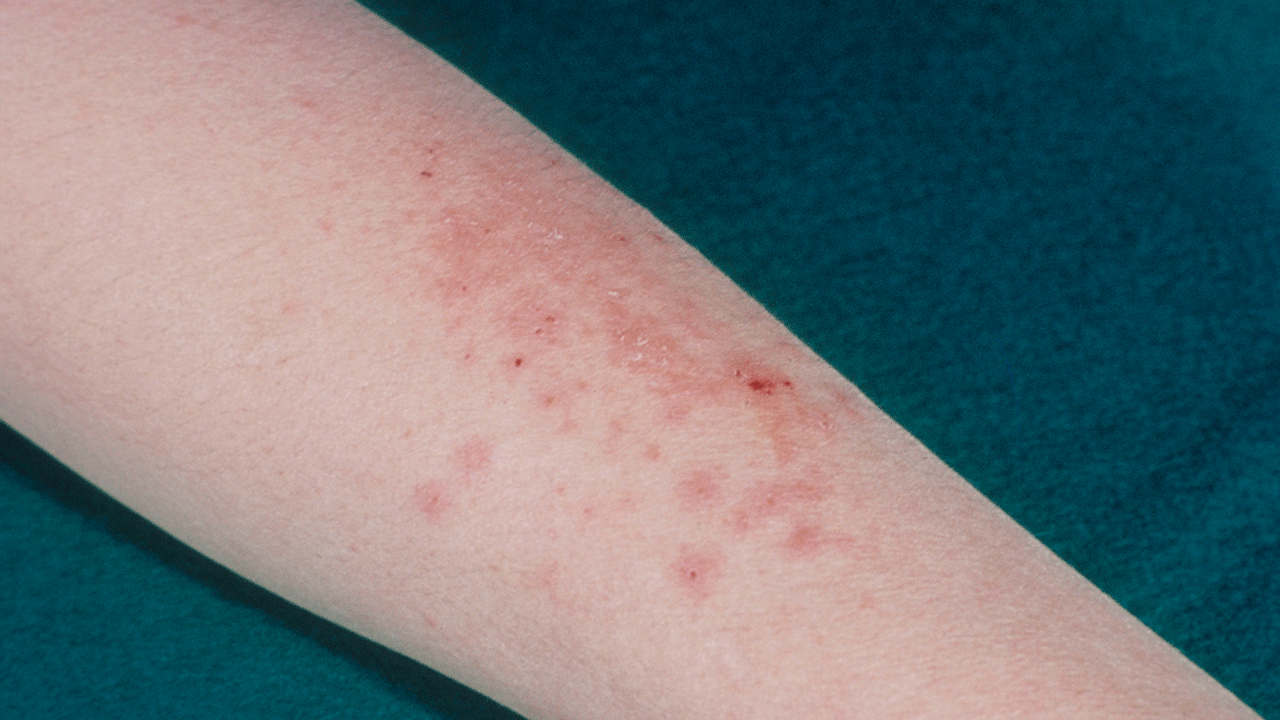New form of rare, sexually transmitted ringworm reported in US.
Health officials are warning about a new case of ringworm likely spread through sex that has been reported in New York City, the first such case in the U.S.
The infection, a rare fungus called trichophyton mentagrophytes type VII (TMVII), was detected in a man in his 30s who reported having sex with multiple men during a trip to England, Greece and California, according to a study published Wednesday at JAMA Dermatology by doctors at NYU Langone Health in New York City.
When the man returned from his trip, he developed a red, itchy rash on his penis, legs, and across his groin and buttocks. The rash looks similar to eczema, a common condition that causes dry, itchy and inflamed skin, as opposed to the typical ringworm fungal skin infection that forms in circles.
WHO CONFIRMS FIRST HUMAN DEATH FROM A(H5N2) BIRD FLU
A person with eczema which looks similar to trichophyton mentagrophytes type VII (TMVII). (BSIP/UIG Via Getty Images)
Tests revealed he had the fungus and doctors prescribed him standard antifungal oral medications – but it took his body four and a half months to clear it.
The man took fluconazole for four weeks without improvement before moving on to terbinafine for six weeks and then itraconazole for eight weeks.
Doctors say he did not have any other infections that could have made the problem worse.
Dr. Avrom Caplan, an assistant professor of dermatology at the NYU Grossman School of Medicine and author of the new report, told NBC that there is no need for the public to be alarmed.
“There’s no evidence that this is widespread, or that this is something that people really need to be worried about,” Caplan told the outlet. “But if people are having itchy eruptions in areas like the groin, and it’s not getting better, see a doctor.”
John Zampella, who also co-authored the study, called on physicians to help identify the fungus.
DR. DEBORAH BIRX ARGUES THERE WAS AN EFFORT TO SQUASH LAB-LEAK THEORY

The co-author of the study called on physicians to help identify the fungus. (iStock )
“Since patients are often reluctant to discuss genital problems, physicians need to directly ask about rashes around the groin and buttocks, especially for those who are sexually active, have recently traveled abroad, and report itchy areas elsewhere on the body,” Zampella said in the statement.
The man’s case is the first recorded in the U.S. and comes as doctors in France reported 13 such cases last year, according to a statement announcing the study. Twelve of those patients were men who had sex with men. The man said he had sex with multiple male partners during his travels, none of whom reported similar skin issues.
Caplan said the infection was most likely transmitted through sexual contact but he couldn’t rule out the possibility that he picked the fungus up at a sauna he had visited two months prior to his symptoms erupting, NBC reports.
According to the study, male genital fungi have been increasing in India, consistent with the emergence of a slightly different form of ringworm called trichophyton indotineae.
Climate, hygiene and bathing practices likely contribute to the spread of that fungus as well as sexual contact.
Caplan previously identified the first two cases of trichophyton indotineae and since then his team at NYU Langone Health has identified a further nine cases of the ringworm in both men and women in New York City.
CLICK HERE TO GET THE FOX NEWS APP

The study was conducted by doctors at NYU Langone Health in New York City. (Noam Galai/Getty Images)
The infection causes similar itchy and contagious rashes as TMVII and poses a greater challenge for dermatologists since it often resists terbinafine treatment, Caplan said.
“These findings offer new insight into how some of the fungal skin infections spreading from South Asia can evade our go-to therapies,” Caplan said. “Beyond learning to recognize their misleading signs, physicians will need to ensure their treatment addresses each patient’s quality-of-life needs.”
Caplan said that he plans to work with leading fungi experts around the U.S. and internationally over the next few months to expand research efforts and track emerging cases.
